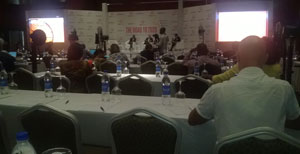The first day of theForum focused on topical issues relating to outcomes such as building robust and efficient data structures for data reporting and impact, reaching key populations via telecoms platforms, prompt and effective treatment of malaria through integrated service, integrated vector management and innovation to combat insecticide resistance, barriers to accessing malaria commodities for accelerated implementation. The President, Mrs Clare Omatseye, sat on the panel that discussed “Barriers to Accessing Malaria Commodities for Accelerated Implementation” where the multiple issues impeding the rapid availability of and planning for malaria commodities at country and regional were examined.
The second day of the Forum considered Innovative Models of Financing for Social Impact. The discourse here centered on practical examples where private sector, private foundation, high network individuals and development agencies can collaborate for better outcomes. The role of the private sector in mobilizing resources and deploying technological capabilities cannot be overemphasized. Some of the funding pools identified include philanthropy, institutional funding, consumer spending, and impact-based investment or financing. However, this was only possible if concerned bodies and agencies did away with Silo Mentality.
Some of the personalities that graced the Forum include the Group Managing Director of Access Bank, Mr Herbert Wigwe, Mr DejiHaastrup, General Manager, Policy, Government and Public Affairs of Chevron Nigeria, Dr KelecjiOhiri, Chief Executive Officer of Health Strategy and Development Foundation, Amb . (Retired) John Simon, Founding Partner, Total Impact Capital, Mr Tomas Hatem of the Global Fund, Mr MuntaqaUmar-Sadiq of the PSHAN among many other dignitaries.

 Malaria
Malaria 




